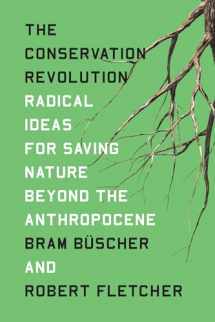
The Conservation Revolution: Radical Ideas for Saving Nature Beyond the Anthropocene
ISBN-13:
9781788737715
ISBN-10:
1788737717
Author:
Robert Fletcher, Bram Buscher
Publication date:
2020
Publisher:
Verso
Format:
Paperback
224 pages
Category:
Economic Conditions
,
Economics
FREE US shipping
Book details
ISBN-13:
9781788737715
ISBN-10:
1788737717
Author:
Robert Fletcher, Bram Buscher
Publication date:
2020
Publisher:
Verso
Format:
Paperback
224 pages
Category:
Economic Conditions
,
Economics
Summary
The Conservation Revolution: Radical Ideas for Saving Nature Beyond the Anthropocene (ISBN-13: 9781788737715 and ISBN-10: 1788737717), written by authors
Robert Fletcher, Bram Buscher, was published by Verso in 2020.
With an overall rating of 4.5 stars, it's a notable title among other
Economic Conditions
(Economics) books. You can easily purchase or rent The Conservation Revolution: Radical Ideas for Saving Nature Beyond the Anthropocene (Paperback, Used) from BooksRun,
along with many other new and used
Economic Conditions
books
and textbooks.
And, if you're looking to sell your copy, our current buyback offer is $2.2.
Description
A post-capitalist manifesto for conservation
Conservation needs a revolution. This is the only way it can contribute to the drastic transformations needed to come to a truly sustainable model of development. The good news is that conservation is ready for revolution. Heated debates about the rise of the Anthropocene and the current ‘sixth extinction’ crisis demonstrate an urgent need and desire to move beyond mainstream approaches. Yet the conservation community is deeply divided over where to go from here. Some want to place ‘half earth’ into protected areas. Others want to move away from parks to focus on unexpected and ‘new’ natures. Many believe conservation requires full integration into capitalist production processes.
Building a razor-sharp critique of current conservation proposals and their contradictions, Büscher and Fletcher argue that the Anthropocene challenge demands something bigger, better and bolder. Something truly revolutionary. They propose convivial conservation as the way forward. This approach goes beyond protected areas and faith in markets to incorporate the needs of humans and nonhumans within integrated and just landscapes. Theoretically astute and practically relevant, The Conservation Revolution offers a manifesto for conservation in the twenty-first century—a clarion call that cannot be ignored.
Conservation needs a revolution. This is the only way it can contribute to the drastic transformations needed to come to a truly sustainable model of development. The good news is that conservation is ready for revolution. Heated debates about the rise of the Anthropocene and the current ‘sixth extinction’ crisis demonstrate an urgent need and desire to move beyond mainstream approaches. Yet the conservation community is deeply divided over where to go from here. Some want to place ‘half earth’ into protected areas. Others want to move away from parks to focus on unexpected and ‘new’ natures. Many believe conservation requires full integration into capitalist production processes.
Building a razor-sharp critique of current conservation proposals and their contradictions, Büscher and Fletcher argue that the Anthropocene challenge demands something bigger, better and bolder. Something truly revolutionary. They propose convivial conservation as the way forward. This approach goes beyond protected areas and faith in markets to incorporate the needs of humans and nonhumans within integrated and just landscapes. Theoretically astute and practically relevant, The Conservation Revolution offers a manifesto for conservation in the twenty-first century—a clarion call that cannot be ignored.


We would LOVE it if you could help us and other readers by reviewing the book
Book review

Congratulations! We have received your book review.
{user}
{createdAt}
by {truncated_author}


